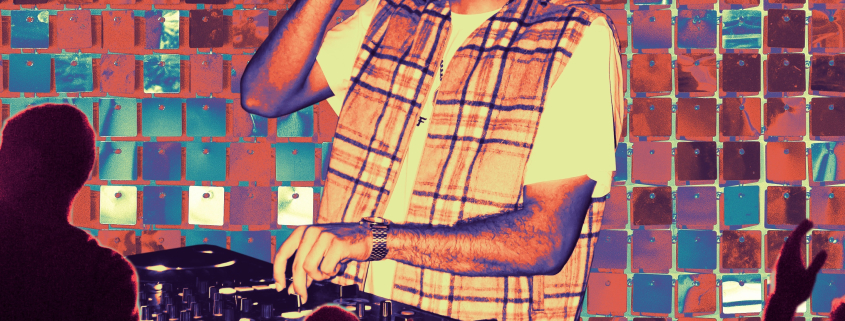Student DJs propel Black culture and community

You can have the venue, the lights, the refreshments and the people, but a party is nothing without the music. DJs breathe life into parties, mixing the latest, freshest beats that uplift the dance floor, get bodies moving and create a vibe to last a lifetime — or at least one night. More than that, though, DJs highlight the beauty of culture and community with music.
On campus and in the city of Los Angeles, some USC students double as DJs, making their names known with sets that you wouldn’t hear at the average frat row function. Playing genres like Afrobeats, Brazilian funk, reggaeton and amapiano, two Black student DJs told us more about how they’ve been navigating the world of disc jockeying while honoring their cultural backgrounds.
Effa Fouda, a sophomore majoring in business, has navigated gigs in L.A. and on campus — including the 2022 Gear Fest, a USC concert hosted by USC’s Black Student Assembly and its member organization Creative Experience. The headliner musicians were IDK and D. Smoke.
The African music Fouda grew up listening to has influenced his style and technique from the start. When he DJs, he hopes to share the Afrobeats genre with his audience and inspire them to discover music from different cultures.
“I’ve always been someone that’s been interested in music and the history of music. And I think that music is really something that brings different people together,” he said. “Hopefully when I’m DJing, I hope you discover new music that you like.”
Fouda shares this love for spreading African culture through music with Pammie Emefiele, a sophomore majoring in electrical and computer engineering. Emefiele is looking to make his mark in the DJ scene with a vast range of genres, namely amapiano and Afrobeats. He also weaves in tunes from France and the United Kingdom.
Emefiele’s set is largely inspired by his Nigerian pride, but his traipse into DJing is motivated by his very simple desire to allow people to have fun. Emefiele wants to be the person that creates a party’s perfect but delicate atmosphere, and DJing’s creative elements — mixing and experimenting — allow him to do just that.
“I think what kind of inspired me to start DJing was the fact that I was going to a lot of parties [and] heard the same type of music, and DJs that weren’t really taking their craft seriously. It was just people that would just play music, fading in [and] fading out,” he said.
The attention to diversity of these students’ DJ sets hasn’t gone unnoticed by students.
Amuche Okeke, a sophomore majoring in pharmacology and drug development and the co-executive director of the Pan African Student Association (PASA) recalled Emefiele’s impact as a DJ. During a bonfire hosted between PASA and the East African Student Association, Okeke, who is Nigerian-American, appreciated the inclusion of Afrobeats, Black American music, and music from various East African countries.
“So when Pammie did play [East African songs], a lot of the East African students were like ‘Whoa, no way. Are you serious?’ and they got super hyped and fun. It’s important to have people like that on campus who will cater to your culture,” Okeke said.“I feel like people were really excited and really happy. They were satisfied with the music that was played because they don’t get a taste of that everywhere or really anywhere on campus.”
It’s positive feedback like Okeke’s that motivates student DJs such as Emefiele, who are often doing this work without any economic gain. In fact, Emefiele still holds on to a moment during his first gig when a professional DJ told him he had great potential.
“To see that so many people are interested and anticipating seeing me DJ is what empowers me to keep DJing and to keep working on my craft,” he said.
Okeke says that DJs such as Fouda and Emefiele are not only getting the word out about Afrobeats as a genre, but strengthening a push for more Afrocentric nightlife events at USC. Emefiele’s gig at the beach was just one event of the many that Okeke thinks will be organized more often. She weighs this prediction on the diversity of USC’s Black student community, and Afrobeats’ rise in popularity among students of different racial backgrounds.
“A simple event like hosting a beach day and making sure people’s music from their culture was played — it’s just a simple thing,” Okeke said. “And people really were receptive towards this. I actually do think that we’re moving towards having a lot more events like that and other orgs are also following suit.”
Recognizing this, Fouda takes charge of planning events as well. With his parties, he wants to showcase not just his skill as a DJ and event planner, but also create opportunities for fellow DJs in the USC community.
“[Planning] basically entails finding DJs that I think people would like and then bringing people together in event spaces [and] venues. Sometimes selling tickets, sometimes it can be free,” Fouda said. “So I guess for the future, [I am] trying to establish myself more in that scene and create a space for DJs to show off their talents as well as allow people to have a good time.”
For each of these DJs, taking on larger-scale events and eventually tours and festivals is the ultimate goal. But for now, they will be sharpening their next big set, lining up gigs and making their mark in the L.A. music scene. Be on the lookout for their sets on campus and around the city because they’ll be making sure they have you on the dance floor.
“I love interacting with the crowd. So my biggest message would be ‘If you’re coming to one of my sets, you better be prepared to dance,” Emefiele said. “I don’t like wall huggers… I want everybody to be interacting, everybody to be dancing, everybody to be having a good time. That’s my biggest message every time I try to DJ.”
Editor’s note: A name has been removed from the original version in the above article.

